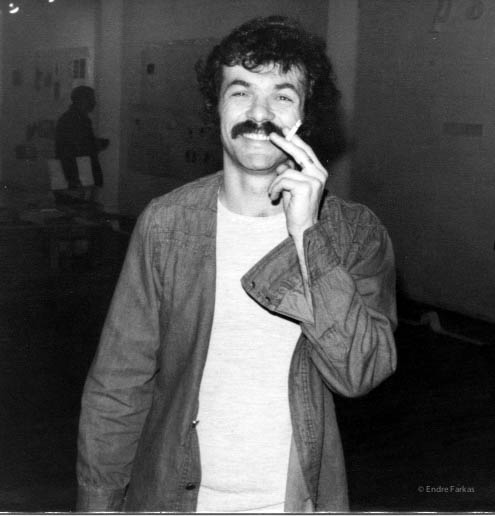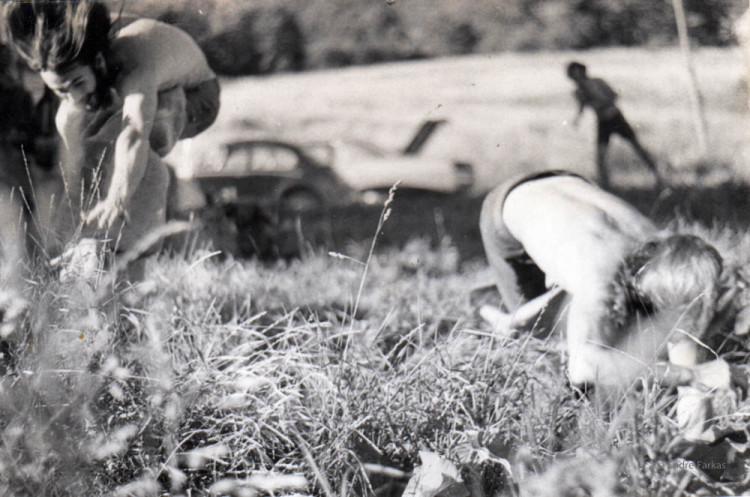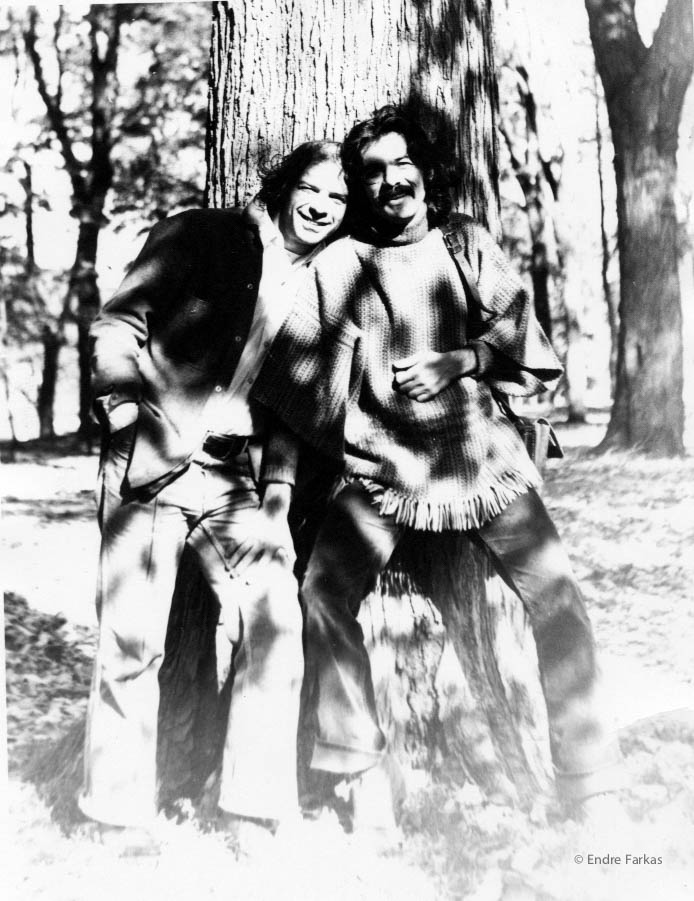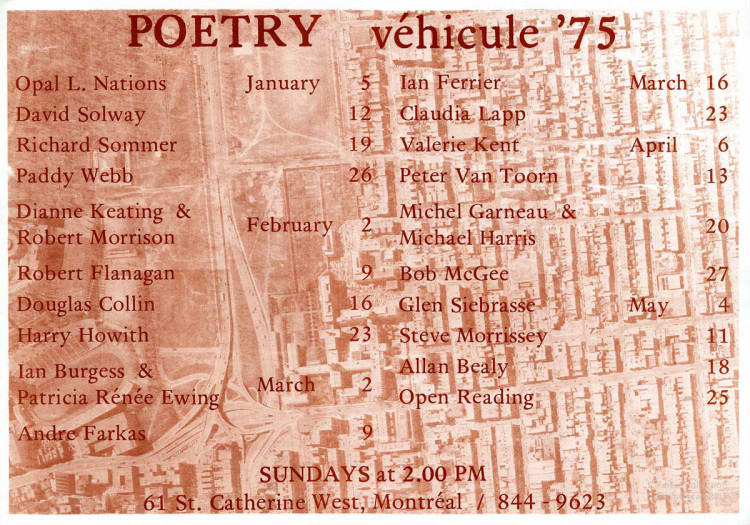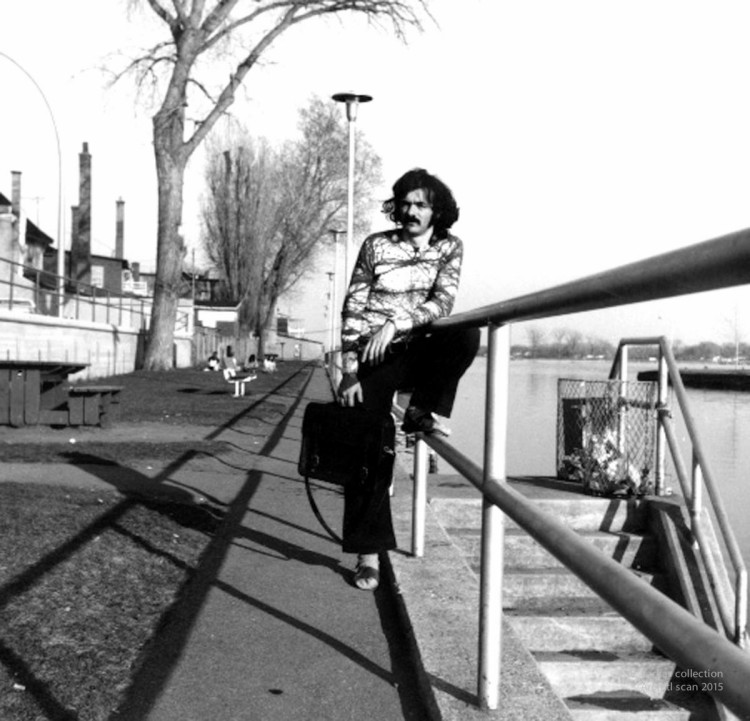Endre Farkas, Montrealer and Véhicule Poet
Endre Farkas came to Montreal as a child after he and his parents (Holocaust survivors) escaped during the 1956 Hungarian uprising. He is a well-known and highly regarded figure in Montreal’s literary scene, coming to the city’s attention as one of the Véhicule poets—the group of poets who held regular poetry readings at the Véhicule Art artist-run gallery in the mid 1970s. He also taught literature at John Abbott College since the 1970s and has remained very active in writing, performing, editing and publishing poetry and literary works in the city and beyond.
Among his own eleven published books of poetry and plays, titles have been translated into French, Spanish, Italian, Slovenian and Turkish. He most recently edited (along with Carolyn Marie Souaid) Language Matters: Interviews with 22 Quebec Poets. He has read and performed widely internationally, and has innovated interdisciplinary pieces with musicians, actors, dancers and other poets live and on radio across Canada and Europe. His videopoem Blood is Blood, co-written/produced with Carolyn Marie Souaid, won first prize at the Berlin International Poetry Film Festival in 2012. His novel Never, Again will be published in 2016, and he is working on turning an early work, Murders in the Welcome Café, into a video-play.
After participating in our round-table discussion at the Blue Metropolis Festival in the spring of 2015 we met in the summer to speak about his school years and the development of his literary career in 1970s Montreal.
As with many of the people interviewed for this project, Endre had connected to the “underground” scene in Montreal as a student in the 1960s, taking in shows by bands such as the Fugs and Sidetrack at the New Penelope Café while not busy taking part in the occupation during the leadup to the infamous Sir George Affair at Sir George Williams University.
He grew up in the “St-Urbain” area (before it was commonly referred to as the Plateau or Mile End), on Park Avenue, on the west side between Fairmount and St-Viateur. With both parents working, he was what was then called a “latchkey kid”, going to school with a copy of the house key because he’d normally get home before his working parents did. He went to Baron Byng High School (where the Sun Youth charity is now located), where several of Montreal’s best-known Jewish writers such as Mordecai Richler had attended. He recalled playing in alleys after school to kill time before supper, or Mont-Royal or Fletcher’s Field (now Parc Jeanne-Mance) but certainly not Outremont Park (which is still somewhat restricted to its residents), or later on going to a pool hall on Clark St. near Rachel.
Unlike the post-Bill 101 era, Farkas explained that in his day, many immigrants of his generation ended up in English rather than in French schools for the main reason that French schools were restricted to Catholics, whereas just about anyone could enrol in a (free) Protestant school. Louis Rastelli spoke with him over the summer of 2015.
…
LR: Did you live in Mile End all through high school?
EF: No, in high school, by that time towards the end of high school, we had moved further up on the scale of success, we lived in Chomedey.
LR: That was one of the first places in the suburbs that Mile-Enders moved on to.
EF: And Park-Ex, Côte-St-Luc, Hampstead –the nouveau riche, sort of the new middle class moved to Chomedey. You could still buy a house with your salary. So I went to high school in Chomedey and was a jock, basically.
LR: I wouldn’t have guessed! And you became an accomplished poet later on.
EF: Well, I always loved soccer. But I connected – it was also the beginning of drugs – I connected with probably the smartest kid in school, in Chomedey High. He was brilliant, also he was 5’5’’ with a beard playing football. So he turned me on to the Beats, I started reading them a little bit but wasn’t sure what it was all about.
And then the grass and hash sort of came in. I was 16, 17. I tried it and started to like it, and one of the things that happened to me was that I started to listen to music and you started to read. Contrary to opinions of the time, I didn’t go insane and I didn’t kill anybody. I started reading, and he was writing his kind of Kerouac rambling prose, and we were listening to Dylan and to the later Beatles, the Doors, and started a literary magazine on our own. We put out about four issues. It was called The Ostrich. Our research showed that the ostrich, contrary to popular opinion, doesn’t stick its head in the ground when danger approaches. In fact it’s the creature that first senses trouble.
When I finished high school, I got a job because of my sports at The Gazette writing sports news. I was their “ethnic” reporter for soccer. Later I used my pass to go and interview John Lennon when he was here for the bed-in. I was there, but I left early, the night they recorded Give Peace A Chance, so I missed out on that. I could have been on that with my bad voice.
I had a picture of him that he signed, but I can’t find it.
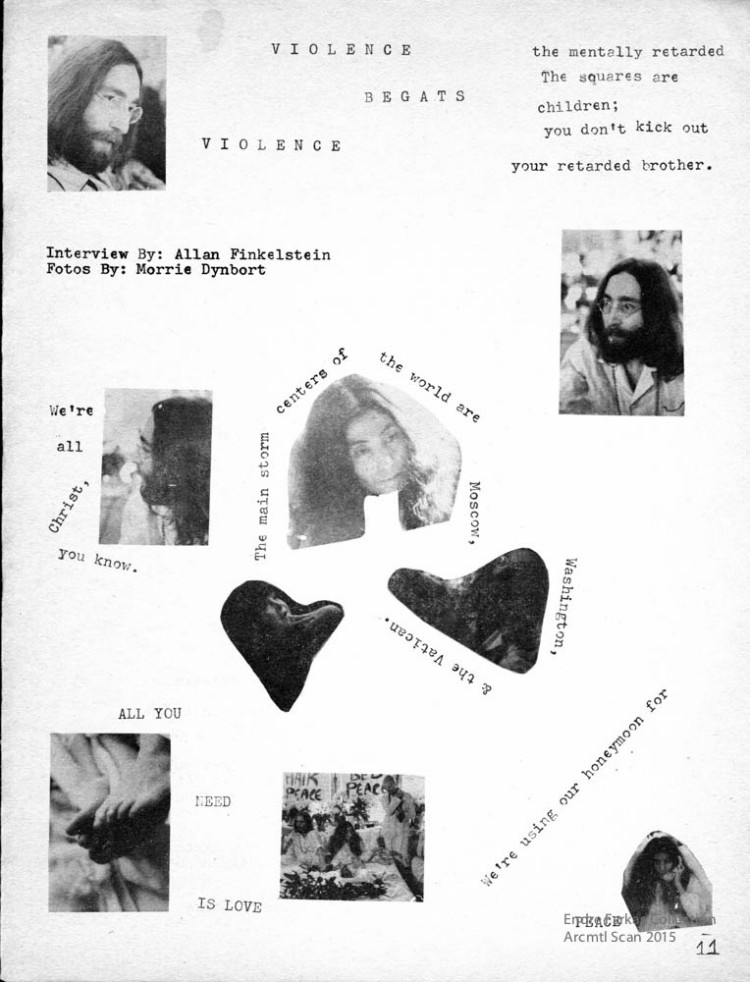
From the zine Ostrich, a contribution in part by John Lennon while he was in Montreal for his sit-in.
LR: So you had already started writing in your last year of high school, and thanks to grass and hash, the guy was into the Beats so I guess you weren’t taught the Beats in any form in school at the time …
EF: Oh no. I don’t even know how Mark got hold of it, and Nietzsche.
Around 1966 when I started at Sir George University, in my Introduction to Canadian Literature consisted of a Mickey Mouse course taught by Michael Gnarowski, a friend of Louis Dudek’s. I was introduced to the work of Leonard Cohen, A.M. Klein, and Irving Layton. I said Hey! These guys are from my neighbourhood! it seemed to me that it was possible to be a writer in Montreal, especially if you are Jewish. (laughs)
LR: So that’s kind of odd– some people would say that there is a challenge to surmount there, but you saw an advantage, like “there is a niche here for me.”
EF: I just thought hey, they’re writing about the neighbourhood. Klein and Layton especially—it was an eye-opener.
LR: Especially after being force-fed Shakespeare and Victorian poetry.
EF: Yeah, and the Romantics and mainly American literature. At that time we had a lot of American professors because of the Vietnam War and draft-dodgers, but their attitude was that Canada had no literature. I remember one of them asking me: where’s your Hemingway, where’s your Faulkner?
LR: Oh boy. I know Canada was looked down at for navel-gazing and writing about itself, obsessing on identity.
EF: That came later. Most of the time it was colonial, the idea that how can Canada be interesting if you have to go to America or Britain to make it, That’s what Richler did and if you stayed here and wrote, you were a nobody. I had Richler as a teacher later on, he taught at Concordia. His teaching consisted of sitting around and chatting and taking us out for drinks after.
LR: Did he smoke in the class?
EF: We all did.
LR: So there was an ashtray on the desk?
EF: You bet. But what these guys taught me is that you can write about the world you live in, and it’s interesting. Part of me got interested in the arts here because it was happening and I could be part of it and nobody said no.
LR: Was there any sense that it was a bit marginalized in Montreal given that it is like today a minority community?
EF: Until the late 60’s, Montreal was the centre of English-language Canadian literature. Louis Dudek was here, Scott was here, Smith indirectly was here, Hugh McLennan.
LR: And it was Canada’s metropolis before Toronto passed us. The years you spent in University were very transformational for the city and in Universities in general across North America. Were you there during the Computer Riots?
EF: No I was part of the occupation (laughs). There were two kinds of occupations there. The first one was the black students’. They took over the computer floors, and maybe a week later, the white students took over the cafeteria in support. We also took over the teacher’s faculty lounge– that’s when the teachers turned against us, when they couldn’t get to their booze. So I was part of that occupation– I mean, just as a body, I wasn’t part of the leadership.
LR: And how did that work? Did you actually have to stay there overnight a certain number of days?
EF: Yeah, we settled in, we brought our sleeping bags,
LR: And runners go to get food?
EF: Well, we took over the cafeteria, so we supplied food, but there was flexibility in coming and going. It was only towards the last couple of nights, when there were rumours of the cops coming that the coming and going was controlled.
LR: So they didn’t have the riot squads out back then? Like for the red square (carré rouge) student movement in 2012?
EF: Oh, no. They were regular cops and nobody ever, in Canada, experienced that kind of problem before. From what I remember, we kept hearing different rumours that there was a compromise where the failed students were going to be allowed to take the tests again.
LR: That was the deal with the black students, the complaint that they had made about the professor failing them all and the review board backing up the teacher.
EF: Yes. And then the cops started to come in just as we assumed that it was over, that it was negotiated. Then the Black students started throwing things out of the computer centre windows: not so much the computers but the punch cards—these held people’s PhD’s, you know. That’s when you could hear from downstairs other students yelling, “Kill the niggers!”
LR: Oh, so there was a counter protest? Much like it is today; a core of students that just want to study and not deal with political shit.
EF: Yes, and don’t interfere with my right for an education even if it means that I may have to pay more for it. It usually broke along the lines of political science, philosophy and English majors to the left, and economics, business and engineering to the right. That hasn’t changed much.
LR: Had you finished your occupation when the punch cards started flying out?
EF: Here’s a kind of almost a soft ending to it… I developed diarrhoea the night before, so I went home because I wasn’t feeling well, and next night the cops raided it. So I never got busted because of my stomach.
LR: Did any of your friends get arrested?
EF: Yeah, but it was mainly the black students who got arrested, the whites were let off with a warning or a fine. Black students got put into jail. I think we were unique in the sense that it was the first such crisis outside of the U.S.
LR: It was January, February 1969..
EF: Nobody knew what to do with it. That was during my undergraduate years – I then took a couple of years off to be a hippie on a commune. The commune in the Eastern Townships was with other budding artists. One of them ended up being Chris Knudsen, who did a lot of my book covers, and then became a part-time teacher in the Fine Arts department.
LR: Were you totally cut off from civilization?
EF: Not really, it was in the Eastern Townships, around Waterloo, but at that time the roads weren’t that good so it was about 2 hours away. Somebody knew somebody who had 1,500 acres on top of a mountain with an abandoned farmhouse. They were looking for people to take care of it to keep the hunters off of it. There were about eight of us, so we got free land, free house, no electricity.
LR: So you had to grow your own weed and vegetables!
EF: Yeah the weed we grew a little bit, I must admit, but actually there was a commune down the road that was more into the weed growing, so we got it from them. We were more a bunch of wanting-to-be artists, visual artists, Chris lived up there for a while, and a photographer named Michel Bonneau. My woman at that point — who later became my wife — was a dancer. There were musicians, too, and so it was more cultural.
LR: So you would have sketchbooks and notepads…
EF: Yeah and typewriters. It was intellectual, it wasn’t cultish, and it was French and English. It was a mix –that’s where I got exposed to Gilles Vigneault, Paul Piché.
LR: Do you remember any French writers or artists in particular?
EF: At our commune? No. the Francophones who were there were more visual. Michel was a photographer, Claire was a visual artist. We all shared one paying job. At the local inn, five of us took turns being a dishwasher, so we made enough money to pay the electricity bill, and the five women each took a day to be waitresses — so you worked one day a week, and collectively we made enough money.
But there were other communes around us that were more political. We got raided once by the RCMP by mistake because they were looking for the other commune: “Québec Libre,” I think it was called. Our commune was called Meatball Creek Farm.
LR: Was that in ’70 when they were looking for the (October Crisis) kidnappers? They did hide in the townships…
EF: Yeah. I had an old manual typewriter that hardly worked I had picked up at the town dump, and when the cops came they confiscated it because they wanted to see if it matched the typewriter used to type the kidnap notes.
LR: You don’t do that kind of forensics anymore these days; now they analyze the digital signature.
EF: And your DNA. So we were more the hippie commune, not the political kind. There was another – “Tournesol” I think it was called — which was the weed-growing one, where everybody walked around naked and grew weed. One year, I think it was in ’74 just before I came back, we knew that the Olympics were going to happen in Montreal in ’76, so we decided to hold the Meatball Creek Farm Olympics. We invited all the other communes to come in and compete. The one requirement was that you had to represent a vegetable—you couldn’t represent a commune, or a country, so it was like carrots or turnips or whatever. We had potato-sack races, we had weed smoking competitions…
LR: I can imagine how that turned out.
EF: We lost track. (Laughs) No winners, no losers! For the opening ceremonies, we had to run up the dirt road that led to our place in a relay, but at each stop you had to have a toke and a beer. Then you ran up.
LR: I was going to ask if you were passing a joint instead of a torch.
EF: Yeah of course! So that was part of our alternative lives. At one point, we finally went macrobiotic, and that’s where I started to write seriously. So by the time that I l
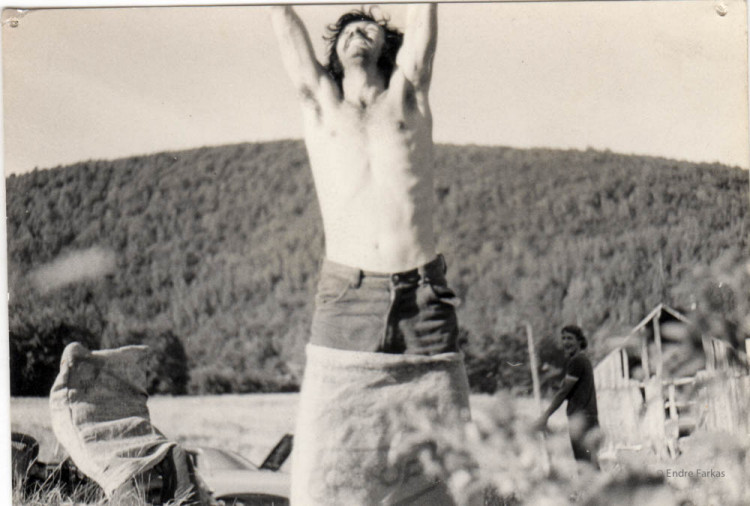
Endre Farkas wins the potato sack race during the mock olympics held between communes in the Eastern Townships, early 1970s.
Around the same time, I started hanging around the Véhicule Art Gallery with Artie Gold, Ken Norris, Tom Konyves. I had found out about Véhicule after I met a colleague, Claudia Lapp, at John Abbott. Her man at the time was François Déry, a visual artist who was part of the collective that started Véhicule Art Gallery. Claudia and Michael Harris were the first ones to run the reading series there, and then Claudia asked me if I wanted to take over. I said sure, as long as I can have Artie with me running the series, because Artie knew a lot more about the scene than I did. So for a couple of years we ran it, and we had just about everybody who published a poem. We brought in the locals that the universities wouldn’t bring in, and also we brought in some of the people who later on read at Concordia. We had bill bisset, the Four Horsemen, we were interested in the different ones. Michael Ondaatje read at Véhicule, we even had Ann Waldman from the States.
We had Steve Morrissey, who then was experimenting with a visual artist to create “Concrete Haikus”. They brought boulders into the gallery. John McCauley got plastic-casted by a visual artist there. Chris Knudsen was working on my mouth, I was working with dancers and musicians, Marie Chouinard performed there, and Margie Gillis.
So Richard’s influence along with all the Véhicule Art Gallery artists’ experimentation made me feel like you could anything you want to do.
LR: There wasn’t any stress that you had to do something “safer” that might get you a grant to pay the bills with, or was it that the cost of living was less of an issue then?
EF: Yeah and rent was dirt-cheap.
LR: What was for example your first apartment when you came back from the commune, what were you paying?
EF: I lived on Wilson below Sherbrooke, near the railroad tracks near de Maisonneuve in a 4 and a half with my woman, I think we were paying $95 a month? I was teaching English to federal government employees. It was Trudeau’s big bilingual push, so the Francophones got money to learn English. After that I got a job at John Abbott College fairly quickly. The CEGEPs were just starting up.
LR: Yeah, they needed a lot of people.
EF: And we were it!
LR: So it wouldn’t take too much work to pay the month’s rent, say a week’s work?
EF: Actually $20,000 a year is what I got the first year.
LR: That was a lot for then!
EF: Yeah. My friend Chris (Knudsen) bought a triplex on Drolet, on the Plateau, for $13,000.
LR: $13,000! In the early 70’s.
EF: Yeah. It was a real rundown neighbourhood, long before it was trendy. He did a lot of work on it.
LR: A lot of literary types settled on Drolet, Laval and around there.
EF: It was so cheap, I wish I bought one myself. But back to your point about grants: you didn’t have to have much to get a Canada Council grant back then. You could easily get $125 to bring in a reader, which were big bucks then.
LR: What about before that era, which only started around ’72, ’73. In the 60s, did you see readings at places like the Yellow Door? I know you mentioned Café Prag at one point, were there readings there?
EF: That was a coffee house, the Yellow Door had its coffee house but it was basically for folk music. There was Karma Café, run by Concordia students opposite of the Hall building, downstairs. That’s where I remember hearing Artie Gold for the first time during an open mic.
LR: Did you go to the New Penelope?
EF: Yeah, but that was just music. I saw The Fugs there, and remember that Tuli Kupferberg started the set reciting their “What To Do in the Event of a Nuclear Attack”. I saw Sidetrack and some other bands there. The Swiss Hut next door was more for people Leonard Cohen’s age, like one generation before us. But we weren’t into drinking that much, we were more into smoking.
LF: What about St. Louis Square and Prince-Arthur, did you hang out much there?
EF: Carré St.Louis was the heroin scene in those early days, and there was no scene on Prince Arthur. My aunt had a little snack bar there. It wasn’t trendy.
LR: I know there was a Polish social club where Café Campus now is. Mazurka sadly closed a couple years ago.
EF: Oh, Mazurka was the greatest restaurant, you could go there and have a cheap meal, eat all the bread all you wanted.
LR: You probably could eat there for 50 cents or something like that?
EF: It was about $2.50 a meal and you could stay there all night if you wanted to but those weren’t literary hangouts for my generation. It was more about the cafés around McGill, and Véhicule Art on Sunday afternoons. In the evenings, we would get together at each other’s places like Artie’s place or my place or Ken’s place, we all lived around. Well actually, I moved near Outremont on Bernard, I had a place with eight rooms for $135 a month, just my wife and I. Back then, you could have six bedrooms on the Plateau or Mile-End, but they’ve all been cut into two places.
LR: It seems like cheap rents are a catalyst for a lot of these creative periods. In the early 70’s there seems to be an explosion a bit different from today, a lot of these things have turned into long-running institutions. Obviously Véhicule Press had its roots there and is very established, The Word is an institution of its own even though it is still small. It seems like the early 60s didn’t have much of that, just a few years earlier it would have been inconceivable to just grab this building and start doing readings.
EF: That was the hippie movement. It was lot more political on the francophone side, but on the English side it was more cultural.
LR: There was still a sense of taking charge of our own generation’s affairs, it doesn’t sound like you guys were looking to go to the big time, you seemed to be happy with where you were or at least comfortable.
EF: It was a different attitude. First of all, I am from the baby boomer generation. A whole bunch of us graduated or came of age around the same time, so that inevitably would have some effect. We were also influenced by the movements down in the States, anti-war and for peace and love, nice ideas to adopt. We didn’t have a war to resist, we offered sanctuary, so that made us good people. So the ideas of coops, the feminist movement, the collectives like the Véhicule Art Gallery seemed like a good alternatives to the hierarchical models. Also the fact that these baby boomer artists had no place to show works made it natural for us to start our own. Véhicule was the second or third alternative gallery to get started in Canada. It ran as a collective– everything was coming together on that shared basis, the commune, the collective, the coop, we worked together, as a possibility that the world could become this. We weren’t looking for careers.
LR: You were trying to build a sort of new way of living as artists?
EF: Yeah. That was all part of the game. We also saw as writers the shifting of the English literary culture to Toronto, and we didn’t want to go there or couldn’t afford to go there, and so we made the scene here. But here, we didn’t have the same kind of press, the same kind of PR, the same kind of drive to be national as they did in Toronto. In the late 60’s, early 70’s people like Atwood, Ondaatje started to emerge, the Toronto establishment pushed them, Northrop Frye spoke of them, and so they became Can-Lit and everyone else was on the margin.
LR: But she was in Montreal at McGill in the early 60’s, and was talked about as an up-and-coming female poet.
EF: That was when Dudek was publishing. Dudek wasn’t that crazy about her at the beginning, because he didn’t like that myth, epic style that Northern Frye was pushing, so there was that political, cultural literary war. Dudek just hated what Frye was doing, hated what Marshall McLuhan was doing.
LR: Really? McLuhan was a bit different, it was more intellectual I guess.
EF: Dudek was convinced that McLuhan was a charlatan.
LR: That he was just pandering to the hippies?
EF: Well, he was a one-phrase wonder, if anything.
LR: The medium is the message.
EF: That was one, and the “Global Village” was another. Dudek wrote quite a few articles against McLuhan. Canada also started to get a sense of identity, English Canada was looking to Toronto, and Toronto was saying: we are the centre. That’s where a lot of the resentment came from.
LR: Do you think some of that was sort of discomfort with the post-October crisis business, because you are talking before Lévesque takes over in 1976….
EF: Well, when the nationalist movement started in Quebec, I think it was a response, not a negative one from the literary world to say well we should also push our own literature, the English-language Canadian literature. There was a move to support that and so the development of the identity, the big thing in the 60’s and 70’s was: what is a Canadian?
LR: So you think maybe the French nationalism and their self-reflection influenced Canada to reflect as well.
EF: Yes, because Quebec was saying: we know who we are, who are you? And most of the literary response from the rest of Canada was silent sympathy. They understood and appreciated, and they somewhat envied the romantic nature of these artists being important to the cultural movement.
LR: So like all these events with Robert Charlebois, Gilles Vigneault…
EF: Yes, La Nuit de la Poésie.
LR: Crowds of tens of thousands and a sense of pride… that must have been impressive-looking given how I could imagine maybe some literary events in Toronto at the time would have been a little dull or a little less passionate.
EF: Yes, but they were also interesting. Coach House Press was really active and interesting, also House of Anansi started up. Talonbooks out West. So there was movement to create an interesting literary culture where you didn’t have to leave the country to make it. So once that shifted over there, the English-language writers in Quebec were left in a very strange, isolated position.
LR: Doubly isolated. Marginalized on both sides.
EF: Yeah, we were a minority within a minority. It was a refrain that was used a number of times, because we didn’t feel connected to the English ruling class that the French were objecting to.
LR: That didn’t mean you were fully sympathetic to their manner or intentions to separate?
EF: Some of us were. I voted yes in the first referendum. There were others like me. I could sympathize with them… by then I was familiar with the history and the idea of an independent state. I put it into the Letter to A.M. Klein that I also felt that if Quebec became independent, I would be in exile again.
LR: Was there a sense that it was a chance to start anew with a fresh country without the baggage of Canada, because having spent some time in a commune, I assume you were on the left side of the political spectrum.
EF: At that point, I was hanging out with separatist friends without any problems.
LR: Both English and French?
EF: Yeah. My French wasn’t good enough so often, unfortunately, when we had heated discussions, they would switch to English and I would try to say it in French but it was so difficult to explain the complexities of what I thought in French, so I said it in English and I responded in English: no, no speak in French! But I understood their desires. When it got to the point where some wanted to deny all rights to the English, that’s when I started to have trouble with it.
LR: So Bill 101 was a bit of a problem.
EF: Well, the thing about Bill 101 was, I still supported it because culture was exempt. In Bill 101, you could still make culture in whatever language you wanted to. I couldn’t care less if you had Eaton or Eaton’s, to me the sign law was absurd. To me, in my leftist view, Eaton’s was an exploiter on all levels anyway, so the apostrophic concern was ridiculous.
LR: What about the schooling? As an immigrant, had you immigrated in the late 70’s, you might not have been able to go to English school.
EF: These things were gradually giving me as a sense of feeling marginalized culturally, of being in a second-class position and to me that is scary. I had joined UNEQ, and they came out with a declaration that the literature of Quebec was French literature only. So I was a member of an organization dedicated to wiping me out!
LR: That’s where the nationalism becomes ethnic nationalism, especially someone from your provenance that has fled a situation where wasn’t tolerance.
EF: Exactly, and my parents being Holocaust survivors…
LR: So you changed your tune a bit between the first referendum and the later years …
EF: Yeah, I understood them, but I didn’t support them. And I thought that there was… I sent my kids to French school, they are fully bilingual, but even my daughter, who has no accent, said that there were times when because her name was Harwood-Farkas, as opposed to Desaulniers or whatever, that she knew she was excluded from certain things. So there was that feeling of being excluded.
LF: Getting back to ’74-’75, Véhicule events, I am looking at some event calendars here and it’s all English. However, a little later on in the game there are people like Lucien Francoeur…
EF: Well Lucien was an interesting case. Lucien was of the generation that hated – well hated might be a strong word –didn’t agree with the nationalist movement. I mean, he loved all things American and most of the Lèvres urbaines – the Urban lips – that’s Claude Beausoleil, Claudine Bertrand a whole bunch of others including J.P. Daoust, these guys were very much American-influenced. They were still very strong French nationalists, but internationalists. I connected with Lucien and brought him into Véhicule for his translation. I was asked by Gaston Bellemare, who ran the Trois-Rivières Poésie festival, to organize English readings there. I started bringing in English writers, so they weren’t opposed to that, but people like Gaston Miron were very hesitant to becoming involved in any way, shape or form with the English. He didn’t trust them. These guys weren’t so afraid of that, they were confident enough in their own world by then. For me, the more mélange, the more goulash, the better. To me, bring on the mix. But the confidence, there is a growing pain to that confidence, and in the 70’s some Francophones maybe had to say “Fuck off, we are the maître chez nous” to build that confidence. Now they’re a lot less like that.
LR: It’s also such a different era, young people are exposed to the world online…
EF: Yes, and they look to the world as a possibility, whereas before, if you were from Quebec and a Francophone, you had to go to Paris and try to make it. Charlebois was booed off stage the first time he sang there because of the joual. Michel Tremblay, his plays were ridiculed because of the joual of Les Belles-Soeurs, and now he’s the darling.
LR: Somewhat similar in a way to say the 1950’s poetry and literary scene would use working-class English, or slang, or saying “yeah,” that must have been a similar liberation in the 70’s.
EF: Yes, taking it back from the academics.
LR: And from the heavy past.
EF: Yeah, and then in Canada there was also the other cultural battle of taking it back from the Americans, or protecting ourselves from the Americans and their influence. And then people like George Bowering were criticized for being influenced by the Black Mountain (North Carolina) poets, Poets like Robert Creely, Robert Duncan, Charles Olson, taught there. Even Irving Layton got criticized for being American, because it was sort of a break from the British influence, of Scott Smith and those guys.
